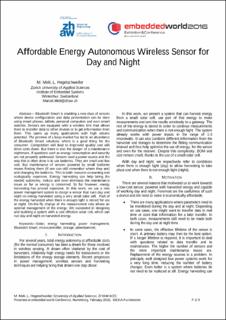Bitte benutzen Sie diese Kennung, um auf die Ressource zu verweisen:
https://doi.org/10.21256/zhaw-2001| Publikationstyp: | Konferenz: Paper |
| Art der Begutachtung: | Keine Angabe |
| Titel: | Affordable energy autonomous wireless sensor for day and night |
| Autor/-in: | Meli, Marcel Hegetschweiler, Lukas |
| DOI: | 10.21256/zhaw-2001 |
| Angaben zur Konferenz: | Embedded World Conference, Nuremberg, Germany, 23-25 February 2016 |
| Erscheinungsdatum: | 2016 |
| Verlag / Hrsg. Institution: | WEKA Fachmedien |
| Sprache: | Englisch |
| Schlagwörter: | Wireless; Power management; Solar; Energy harvesting |
| Fachgebiet (DDC): | 004: Informatik 621.3: Elektro-, Kommunikations-, Steuerungs- und Regelungstechnik |
| Zusammenfassung: | Bluetooth Smart is enabling a new class of sensors where device configuration and data presentation can be done using smart phones, tablets, personal computers and even smart watches. Sensors are equipped with a wireless link that allows them to transfer data to other devices or to get information from them. This opens up many applications with high volume potential. The promise of a large market has led to an abundance of Bluetooth Smart solutions, which is a good thing for the consumer. Competition will lead to improved quality and will drive costs down. But there is also the danger of a maintenance nightmare, if questions such as energy consumption and security are not properly addressed. Sensors need a power source and the way this is often done is to use batteries. They are small and low cost. But maintenance of sensors powered by small batteries means finding them (if one can still remember where they are) and changing the batteries. This is both resource consuming and ecologically expensive. Energy harvesting can help bring the needed autonomy, reduce and even eliminate the maintenance issues as far as energy is concerned. So far however, energy harvesting has proved expensive. In this work, we use a new power management system to design a sensor that runs day and night on energy harvested using a very small solar cell. Part of the energy harvested when there is enough light is stored for use at night. On-the-fly change of the measurement rate allows an optimal management of the energy. We succeeded in designing and building a system with a cost effective solar cell, which can run day and night on harvested energy. |
| URI: | https://digitalcollection.zhaw.ch/handle/11475/7042 |
| Volltext Version: | Publizierte Version |
| Lizenz (gemäss Verlagsvertrag): | Lizenz gemäss Verlagsvertrag |
| Departement: | School of Engineering |
| Organisationseinheit: | Institute of Embedded Systems (InES) |
| Enthalten in den Sammlungen: | Publikationen School of Engineering |
Dateien zu dieser Ressource:
| Datei | Beschreibung | Größe | Format | |
|---|---|---|---|---|
| EW2016 meli-paper-affordable day and night sensor_V2.pdf | 572.46 kB | Adobe PDF |  Öffnen/Anzeigen |
Zur Langanzeige
Meli, M., & Hegetschweiler, L. (2016). Affordable energy autonomous wireless sensor for day and night. Embedded World Conference, Nuremberg, Germany, 23-25 February 2016. https://doi.org/10.21256/zhaw-2001
Meli, M. and Hegetschweiler, L. (2016) ‘Affordable energy autonomous wireless sensor for day and night’, in Embedded World Conference, Nuremberg, Germany, 23-25 February 2016. WEKA Fachmedien. Available at: https://doi.org/10.21256/zhaw-2001.
M. Meli and L. Hegetschweiler, “Affordable energy autonomous wireless sensor for day and night,” in Embedded World Conference, Nuremberg, Germany, 23-25 February 2016, 2016. doi: 10.21256/zhaw-2001.
MELI, Marcel und Lukas HEGETSCHWEILER, 2016. Affordable energy autonomous wireless sensor for day and night. In: Embedded World Conference, Nuremberg, Germany, 23-25 February 2016. Conference paper. WEKA Fachmedien. 2016
Meli, Marcel, and Lukas Hegetschweiler. 2016. “Affordable Energy Autonomous Wireless Sensor for Day and Night.” Conference paper. In Embedded World Conference, Nuremberg, Germany, 23-25 February 2016. WEKA Fachmedien. https://doi.org/10.21256/zhaw-2001.
Meli, Marcel, and Lukas Hegetschweiler. “Affordable Energy Autonomous Wireless Sensor for Day and Night.” Embedded World Conference, Nuremberg, Germany, 23-25 February 2016, WEKA Fachmedien, 2016, https://doi.org/10.21256/zhaw-2001.
Alle Ressourcen in diesem Repository sind urheberrechtlich geschützt, soweit nicht anderweitig angezeigt.